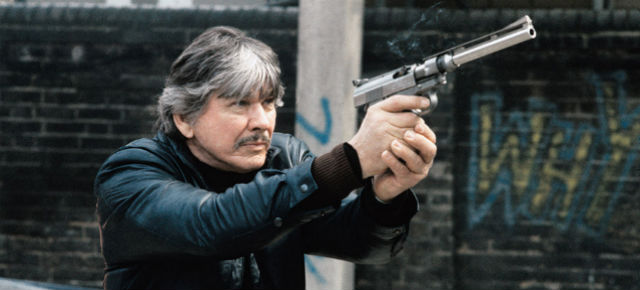Ever wonder who’s responsible for the trove of cringeworthy, if classic, B-movies?Electric Boogaloo: The Wild, Untold Story of Cannon Films,currently playing at the Toronto International Film Festival, is the inside story of the gonzo gusto of Menahem Golan and Yoram Globus, Israeli cousins who arrived in the US intent on dominating the film industry.
The duo formed Cannon Films, a low-budget movie powerhouse that churned out a berserk catalogue of titles. They’re the movies you’ll see flipping through late-night cable, heavy in Chuck Norris, horror, and Death Wish sequels: American Ninja, Breakin’, Breakin 2: Electric Boogaloo, The Texas Chainsaw Massacre 2, King Solomon’s Mines.
Cannon churned out up to 43 films a year, helped bring both breakdancing and ninjas into popular culture, and gave B-movie enthusiasts a trove of impressively bad features. The special effects were especially godawful. The cousins’ cheapskate approach led to some spectacularly cheesy sequences, as they tried to make their movies as quickly and cheaply as possible.
In Masters of the Universe, for instance, instead of creating a skeleton head out of special effects for the villain Skeletor, they opted to just paint white skull makeup on Frank Langella.
Even during Cannon’s bigger-budget attempts at legitimacy, like Superman IV, turned into ridiculous, cut-rate productions. Superman IV was originally intended to have a much larger budget, and when Cannon ran into financial trouble, it essentially slashed the special effects budget and released a half-finished film. This isn’t even the worst of it:
In making the documentary, Director Mark Hartley interviewed a long list of actors, directors, and industry types who worked with Cannon, including Bo Derek, Elliott Gould, Molly Ringwald, and Dolph Lundgren. The interviewees are, almost without fail, still in awe of the Cannon chutzpah, though more than willing to discuss the cousins’ numerous flaws and foibles.
At times the film feels like you’re eavesdropping on a particularly juicy session of old Hollywood gossip: Someone reveals that Golan pitched an entire movie directly to an orangutan and cast Sharon Stone by mistake. He also decided to replace the orangutan with a human actor in a monkey outfit later on.
Interviewees describe Golan as a brazen, irascible Jabba-the-Hutt type, almost cartoonishly lacking in taste, a schlock connoisseur whose forays into critical success were happy accidents as he barreled through the film industry intent on getting as many pictures made and sold as he could. Yoram, the quieter and more business-minded of the cousins, is less vividly remembered, and recedes into the background of the documentary, though his own skill at deal-making helped Cannon establish itself as a remarkably sales-savvy company, even as it continuously neglected thinking about stuff like whether a script made any sense.
Golan cut his teeth as a director, and although he seemed to see no distinction between the cheap, crass B-movies his company spewed out and the cinema he aspired to produce, he was a champion for a surprisingly wide array of auteurs in search of artistic freedom and funding, including Jean-Luc Godot, John Cassavetes, and Franco Zeffirelli, injecting just enough art-house cred into his company’s otherwise terrible reputation to thoroughly confuse people.
The documentary is engrossing, though it relies too heavily on clips from the Cannon archives; I wanted to know more about early days of the company, and more details about its downfall, which is covered quickly towards the end. While the overabundance of clips makes it feel padded, Golan is such a larger-than-life character that I left the theatre wanting to know more about what happened to him (he died last month at 85, before this movie came out but after he managed to quickly release a documentary about Cannon called The Go-Go Boys).
The film brushes up against the way Golan ended up influencing the Hollywood machine even as it kept him at bay; for instance, though almost no one remembers the bizarre flop Over the Top, which starred Sylvester Stallone as a trucker-turned-arm-wrestler, Golan’s financially knob-headed decision to get Stallone to appear in one of his films by offering him an at-the-time outrageous sum of over $US10 million to star had a ripple effect on the industry, as other actors demanded similar fees from larger studios.
Cannon’s B-movie bonanza is an obvious source of inspiration for directors like Quentin Tarantino who juxtapose genre elements with comedy. And perhaps most importantly, Cannon’s success outside the studio system provided both a roadmap and a guide for what not to do for independent filmmakers, and set up a business model for selling foreign rights that remains relevant.
A lot of the movies produced by Cannon were exploitative and repulsive. The company tactics were even worse. One of the anecdotes relayed in the documentary involves Golan holding a gun to someone’s head rather than delay shooting. However poorly expressed, the deep-seated love the cousins had for the movies makes it hard to root against them as you watch, especially since their company’s doom is never in question. Cannon is dead, and should be. But the passion Golan felt for stories is something that should be remembered.
Picture: TIFF
